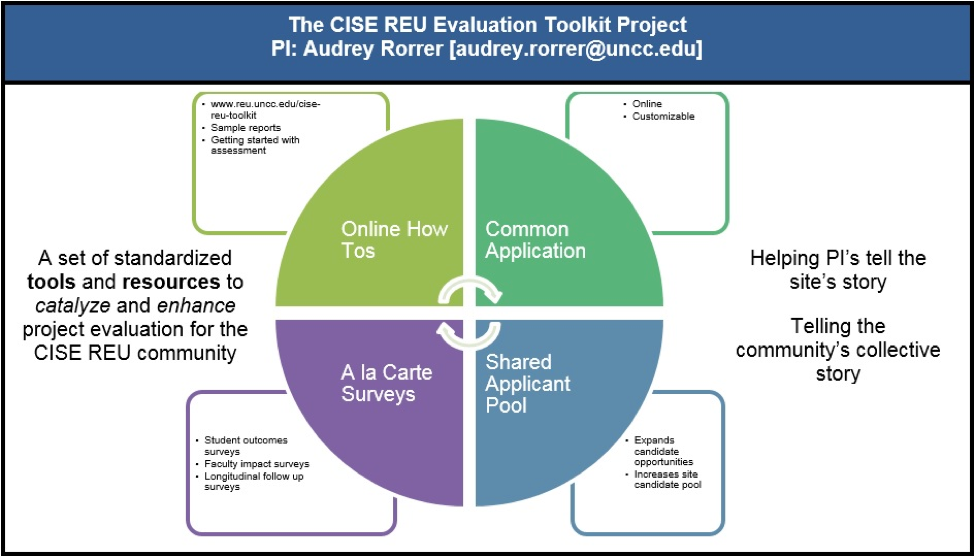YOUR REU SITE
Sections:
Setting Up Your Website:
- Your REU website will serve as a tool for recruiting prospective students and opening up an application for them to use.
- The website should be straightforward, and the application section should be clear and easy to find, otherwise, it might deter students from applying.
- Applications should be made available around October, this grants students enough time to consider their options, ask and clarify any questions, and gather the necessary materials (letters of recommendations, build a cover letter or essay, etc.).
- The website also allows building a foundation that highlights the research that is done at your REU. This can be done through short project descriptions, photos, videos, and any other helpful promotional material that will encourage students to apply to the program.
- Similarly, pictures and other forms of shared materials about your program, allow for building internal community and showcasing the positive aspects of your REU site.
- The website can then be used as a portal for all the stakeholders to visit and experience the following (but not limited to):
- Keep an updated agenda of the program
- Post pictures of projects and extracurriculars
- Keep students’ blogs
- Share class and project materials
- For inspiration, use existing websites in the active REU NSF listing
Setting Up Your Lab Space:
- Before the students’ arrive at your REU site, the necessary hardware, software, and space should be arranged and prepared accordingly to accommodate the students and projects’ needs. Make sure:
- Lab space(s) or designated areas accommodate necessary project tools and/or hardware
- Laptops, desktops, and other equipment are up and running
- Any software has been installed and tested beforehand
REU Site Renewal and Solicitation:
- Program Solicitation (as per NSF guidelines ):
- The REU Program Solicitation, which can be found under “PROGRAM GUIDELINES” on the REU Program Overview page, provides instructions on how to apply for an REU Site or an REU Supplement.
- Proposals for REU Sites must be submitted by the annual deadline, which is advertised in the solicitation. Each disciplinary unit has a point-of-contact for questions about REU Site proposals, which can be found on the Web page REU Site Contacts .
- Although proposals for the renewal of successful REU Sites are welcome, investigators are reminded that such proposals will be reviewed through the normal merit review process and there is no guarantee that a renewal grant will be awarded.
- REU Supplement and Renewal (as per NSF guidelines ):
- A request for an REU Supplement may be submitted in either of two ways:
- Proposers may include an REU Supplement activity as a component of a new (or renewal) research proposal to NSF. For guidance, contact the program officer who manages the research program to which the proposal would be submitted.
- Investigators holding an existing NSF research award may submit a post-award request for supplemental funding. For guidance, contact the cognizant program officer for the NSF grant or cooperative agreement that would be supplemented.
- A request for an REU Supplement as part of a proposal for a new or renewal grant or cooperative agreement should be embedded in the proposal as follows:
- Enter the description of the REU activity (namely, the information described above in the fourth paragraph under the subheading “REQUEST FOR REU SUPPLEMENT”) in the section for Supplementary Documentation.
- Limit this description to three pages.
- Include the budget for the REU activity in the yearly project budget.
- Enter all student costs under Participant Support Costs (Line F on the FastLane budget form and Field E on the Grants.gov budget form). (Indirect costs [F&A] are not allowed on Participant Support Costs in REU Site or REU Supplement budgets.)
- As part of the Budget Justification, provide a separate explanation of the REU Supplement request, with the proposed student costs itemized and justified and a total given for the items plus associated indirect costs. If the intent is to engage students as technicians, then an REU Supplement is not the appropriate support mechanism; instead, support should be entered on the Undergraduate Students line of the proposal budget.
NSF Annual Report:
- As per NSF: Principal Investigator submits an annual project report to the cognizant Program Officer at least 90 days before the end of the current budget period. Within 90 days after the expiration of a grant, the PI is also required to submit a final project report, and a project outcomes report for the general public. Failure to provide the required annual or final project reports, or the project outcomes report will delay NSF review and processing of any future funding increments as well as any pending proposals for that PI. PIs should examine the formats of the required reports in advance to assure the availability of required data. REU Site awardees are expected to establish a Website for the recruitment of students and dissemination of information about the REU Site and to maintain the Website for the duration of the award. PIs are required to furnish the URL for the Website to the cognizant NSF program officer no later than 90 days after receiving notification of the award. Read More .
- TIP: Start the annual report for a given summer before that summer is over, and add the Participants to the report. That will trigger your students and mentors to receive an email from NSF requesting their demographics, and while they’re thinking about the REU site that summer, they’re more likely to reply.
